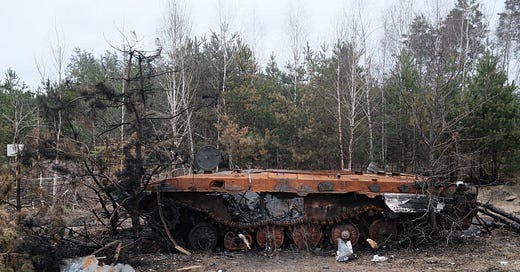Geopolitical Chess - Tracing the Possible Russia-Iran-hamas Nexus
Photo by Sonia Dauer on Unsplash
The complex dynamics of the global geopolitical landscape often reveal convoluted narratives that intertwine the destinies of disparate nations. Amid the smouldering tensions in Ukraine and the recent unprovoked aggression by hamas terrorists against Israel, whispers of a possible nexus between Russia, Iran, and hamas reverberate across the international arena. The sudden flare-up of violence in Israel, paired with the distinct military tactics witnessed, unfolds a story that potentially transcends regional boundaries, binding the fates of distant nations in a tightly woven geopolitical script.
A crucial tactic that bridges these seemingly unrelated conflicts is the use of drones to drop grenades on tanks — a strategy previously witnessed in Ukraine, now mirrored in the Israeli front. This signature tactic, often associated with Russian-backed forces in Ukraine, raises compelling questions about the Kremlin’s possible reach into the Middle East, particularly through the conduit of Iran, a known benefactor of hamas.
Historically, Iran has been a staunch supporter of hamas, channeling both financial and military aid to bolster the group’s standing against Israel. The symbiotic relationship between Iran and hamas could potentially serve as a gateway for Russia to extend its sphere of influence into the Israeli front, a move that would not only divert global attention from its actions in Ukraine but also further its strategic interests in the Middle East.
The recent uptick in tactical sophistication showcased by Hamas hints at external assistance, possibly from entities well-versed in covert military operations. The secrecy surrounding these strategies further amplifies the likelihood of involvement from state actors with a history of clandestine military support. Russia, with its extensive military expertise and known covert operations in other global hotspots, emerges as a plausible candidate. The discrete transfer of knowledge and resources from Russia, possibly channeled through Iran, could have provided Hamas with the necessary guidance to execute these seemingly top-secret level strategies, elevating the threat they pose to a new, more dangerous level.
The hypothesis of Iran acting on the behest of Russia isn’t entirely unfounded. The diplomatic and military entente between Russia and Iran is well-documented. They share a common interest in countering US influence in the Middle East, and their cooperative ventures in Syria are a testament to their aligned strategic ambitions. By fanning the flames of conflict in Israel through hamas, they might aim to divert US resources and attention, creating a smokescreen that obscures Russia’s actions in Ukraine and Iran’s nuclear ambitions.
Moreover, the collaborative effort between Russia and Iran could extend beyond mere financial or military aid to hamas. It could encompass strategic military advice, sharing of intelligence, and provision of sophisticated weaponry — echoes of which are seen in the refined drone tactics employed in the recent assault on Israel. The ripple effects of such a collaboration could potentially reverberate across the Middle East.
Furthermore, the tactical similarities between the conflicts in Ukraine and Israel could potentially signify a broader strategy orchestrated by Russia and Iran. The choreographed military maneuvers, the precision of the attacks, and the timing amidst global distractions all hint at a well-calculated, possibly coordinated campaign.
Adding another layer of complexity to this geopolitical puzzle are recent events in Egypt. On October 8, 2023, a shooting incident occurred in Alexandria, Egypt, where a police officer fired on bus passengers, killing three and injuring one. Two of the victims were Israeli, hinting at the extension of the conflict beyond Israel’s borders. Moreover, Egypt has witnessed significant terrorist activity, with attacks on military checkpoints in Sinai claiming the lives of Egyptian troops. The majority of terrorist attacks in Egypt have targeted security forces, especially in the Sinai Peninsula, yet civilians and tourists in mainland Egypt continue to be at risk.
Establishing a concrete link between Russia, Iran, and the events in Israel and Egypt requires meticulous investigation backed by robust intelligence. The speculative nature of this nexus necessitates a thorough, unbiased analysis by the international community to unveil the hidden threads of alliance and shed light on the broader geopolitical landscape.
The potential Russia-Iran-hamas nexus underscores the labyrinthine and interwoven dynamics at play on the global stage. The mirrored military tactics in Ukraine and Israel, amid the backdrop of escalating geopolitical tensions, beckon a deeper examination of the invisible alliances shaping the contours of conflict from Eastern Europe to the Middle East. A holistic understanding of the larger geopolitical chessboard may be pivotal in fostering stability and charting a path toward a more harmonious global order.





